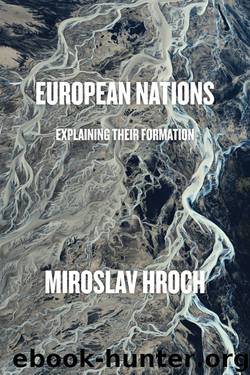European Nations by Miroslav Hroch

Author:Miroslav Hroch
Language: eng
Format: epub
Publisher: Verso Books
CHAPTER 8
National Myths and the Search for a Common Destiny
A national history was one of the main arguments commonly used in the nineteenth century to achieve mobilization (and civic education) of one’s national group, and to justify one’s ethnic group’s right to exist as a nation. Despite this, opinions about the significance of history for modern nations and nationalism differed greatly.
There was agreement on the ‘perennialist’ idea of a nation, and that the past was thus the decisive criterion of a nation’s existence. An important question is what this past entailed. When history stood for political history, as was the prevailing tendency within traditional historiography, the existence of state-nations was easily explained by the continuity of their political history. From this perspective, the French, Swedish and Dutch nations existed simply because they each had their own state-national history. The German nation ‘obtained’ its history by means of adoption, or, rather, national adaptation of the Holy Roman Empire (of the German Nation). ‘Having one’s own history’ meant existing as an indisputable entity in a historical continuity, and this concept did not originate in modernization. It was clearly a relic of the premodern, feudal mentality, according to which the right to anything rested on old privileges. The older a state, a dynasty or an aristocratic family was, the more prestigious or noble it was considered to be.
Another acceptable argument in favour of a nation’s existence was its former, medieval statehood, which had only recently been interrupted by external circumstances. This, however, posed difficulties in deciding what lapse of time and what degree of loss of independence were admissible. The circumstances under which the given medieval state had lost its sovereignty came to be seen as crucial.
This traditionalist approach gave rise to the already-mentioned differentiation between ‘historical’ and ‘unhistorical’ nations during the mid-nineteenth-century struggles for national demands.1 The existence of historical nations was justified by a history of statehood (albeit limited), which made them historically legitimate. Unhistorical nations lacked a political tradition, and thus also a ‘history’. The historical argument was accepted by international public opinion especially in the case of Poland, which was being destroyed by its neighbouring powers. Discontinued statehood was also regarded as a viable argument in the struggles over the formation of the Hungarian and Croatian nations. In contrast, the continuity of statehood was usually called into question in the Czech case (the Lands of the Bohemian Crown had been part of the Holy Roman Empire) and in the Scottish case (due to the Union of 1707). On the other hand, statehood could not serve as an argument employed by political history in places where nation-forming took place within ethnic groups with no adaptable state tradition, such as the Finns, Latvians and Slovenians.
It is true that most scholars nowadays no longer share the opinion of the German (and not only German) Liberals of the 1848 revolution that only ‘historical nations’ have the right to be generally recognised. However, present-day ‘Western’ research still sometimes continues to indicate latent doubts as
Download
This site does not store any files on its server. We only index and link to content provided by other sites. Please contact the content providers to delete copyright contents if any and email us, we'll remove relevant links or contents immediately.
| Anthropology | Archaeology |
| Philosophy | Politics & Government |
| Social Sciences | Sociology |
| Women's Studies |
The Secret History by Donna Tartt(19023)
The Social Justice Warrior Handbook by Lisa De Pasquale(12182)
Thirteen Reasons Why by Jay Asher(8882)
This Is How You Lose Her by Junot Diaz(6869)
Weapons of Math Destruction by Cathy O'Neil(6260)
Zero to One by Peter Thiel(5782)
Beartown by Fredrik Backman(5729)
The Myth of the Strong Leader by Archie Brown(5491)
The Fire Next Time by James Baldwin(5422)
How Democracies Die by Steven Levitsky & Daniel Ziblatt(5209)
Promise Me, Dad by Joe Biden(5139)
Stone's Rules by Roger Stone(5078)
A Higher Loyalty: Truth, Lies, and Leadership by James Comey(4945)
100 Deadly Skills by Clint Emerson(4910)
Rise and Kill First by Ronen Bergman(4772)
Secrecy World by Jake Bernstein(4736)
The David Icke Guide to the Global Conspiracy (and how to end it) by David Icke(4696)
The Farm by Tom Rob Smith(4500)
The Doomsday Machine by Daniel Ellsberg(4480)
